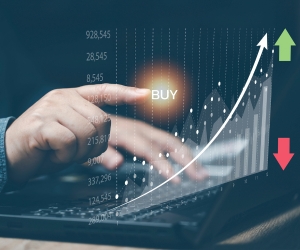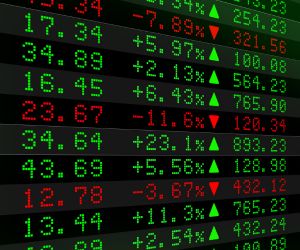Bank of America is a major player in the financial industry, known for its wide range of banking and financial services. It is listed on the New York Stock Exchange (NYSE), a prominent platform for leading financial institutions. So, is it a good investment? Are there ups and downs? What investment strategy should I use with this stock? This article will answer these questions and more.

Steps to Invest in Bank of America
Research and Analysis:
Bank of America is one of the leading banks in the US and worldwide, with a presence in commercial banking, investments, and wealth management. Before investing in BAC, review its financial reports, net interest margin levels, the effects of the Federal Reserve's monetary policy, and the economic developments in the US.Opening an Investment Account:
Bank of America (BAC) shares are traded on the NYSE. To invest, you need an account with a brokerage firm that provides access to US markets. Some platforms allow the purchase of fractional shares, facilitating investment with less capital. Typically, they will require a copy of your photo ID and a utility bill (such as from a power or water company) to verify your identity and address. Compare commissions, trading platforms, and services offered by each brokerage to choose the one that best suits your needs.Define Your Investment Strategy:
BAC is a stock influenced by interest rates and economic activity. It can be appealing for long-term investors due to its stability and dividend payments but is also used by short-term traders looking to capitalize on financial sector movements.Execution and Monitoring:
It's crucial to monitor data such as Fed interest rates, banking sector performance, loan and deposit volumes, and bank profitability. BAC tends to react to events such as quarterly reports, financial regulations, and changes in inflation.Diversification of Portfolio:
To reduce risks, you can diversify with other banking stocks such as JPMorgan Chase (JPM), Wells Fargo (WFC), or Citigroup (C). You may also opt for financial ETFs like the Financial Select Sector SPDR Fund (XLF), which includes major US banks.
SWOT Analysis of Bank of America as an Investment
This SWOT analysis examines Bank of America, one of the largest banks in the United States and the world. It identifies the Strengths and Weaknesses (internal) and Opportunities and Threats (external) that influence its position in the financial sector.
Strengths:
Global presence and financial solidity: Bank of America has an extensive network of branches and a strong capital position, providing stability.
Product diversification: It offers retail banking, investment, loans, insurance, and asset management services, reducing dependence on a single line of business.
Innovation and digitalization: Investment in technology and digital channels strengthens its competitiveness in an increasingly digital financial environment.
Economies of scale: Its large size allows cost optimization and service offerings to a wide customer segment.
Weaknesses:
Exposure to volatile markets: Being a global bank, it is subject to economic crises and changes in international markets.
Credit quality risks: Macroeconomic factors and the loan portfolio can impact delinquency rates and loss provisions.
High regulatory compliance costs: Operating in multiple jurisdictions involves facing strict regulations and supervision costs.
Opportunities:
Growth of digital banking: Digital transformation opens opportunities to reduce costs and attract new customers, especially in younger segments.
Expansion in emerging markets: Investing in high-growth potential regions can diversify income and reduce dependence on mature economies.
Strategic alliances with fintechs: Collaborating with financial technology companies can enhance innovation and offer more agile services.
Threats:
Global economic instability: International crises and recessions can reduce the demand for financial services and affect solvency.
Disruptive competition: The emergence of neobanks and fintechs could erode the traditional banking market share.
Cybersecurity risks: The growing threat of digital attacks requires high investments in security and can affect customer trust.
What is an International Stock Broker?
An International Stock Broker is the entity (or platform) that allows you to buy and sell shares of companies listed on stock exchanges in different countries around the world. Unlike a local brokerage, the primary focus of International Brokers is to offer access to global markets, such as the American, European, or Asian markets.
Why do we need an International Stock Broker?
Investing in international stocks can be an excellent way to diversify your portfolio, as it gives you the opportunity to participate in the growth of economies and sectors worldwide. However, operating in global markets is not as simple as in the local market: it requires specific knowledge, compliance with international regulations, and the use of advanced trading platforms.
An International Stock Broker brings all these investment opportunities together in one place and allows you to access different exchanges and trading conditions, in exchange for a commission.
Examples and comparisons:
There are several well-known International Stock Brokers, such as Interactive Brokers, eToro, TD Ameritrade, or Saxo Bank, among others. Each offers trading platforms with specific features and commissions that vary according to the service. Some stand out for providing market analysis and advice in several languages, while others may offer more competitive operating costs or social investment tools. These details allow you to choose the option that best suits your needs and investor profile.
Regulatory and security aspects
It is essential that the International Stock Broker you choose is regulated by recognized entities in the country where it operates, such as the U.S. Securities and Exchange Commission (SEC) in the United States, the Financial Conduct Authority (FCA) in the United Kingdom, or the Comissão de Valores Mobiliários (CVM) in Brazil, among others. This supervision ensures that the broker complies with strict security and transparency standards, providing you with greater confidence when investing your money.
How do Brokers "connect" to International Markets?
Through agreements with foreign stock exchanges and the use of advanced technological platforms, International Stock Brokers process the buy and sell orders placed by their clients. They arrange transactions based on price, order of arrival, and other parameters, and charge a commission when the operation is executed. This technological infrastructure allows operations to be carried out quickly and securely, facilitating real-time tracking of your investments.
In conclusion, an International Stock Broker is your gateway to the most important stock markets in the world. Thanks to its regulation, trading platforms, and global market knowledge, you can diversify your portfolio and seek growth opportunities in different sectors and countries.





